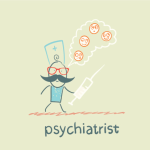 Historically, mental illness is a subject that is often met with discomfort, skepticism, and fear. As a result, the world of Psychiatry, unless a person has actually seen a Psychiatrist, or knows someone who has, is often met with these same feelings of skepticism. In fact, here are five misconceptions that many Psychiatrists, like myself, struggle to correct or debunk in their practice.
Historically, mental illness is a subject that is often met with discomfort, skepticism, and fear. As a result, the world of Psychiatry, unless a person has actually seen a Psychiatrist, or knows someone who has, is often met with these same feelings of skepticism. In fact, here are five misconceptions that many Psychiatrists, like myself, struggle to correct or debunk in their practice.
1. Seeing a Psychiatrist Means You are ‘Crazy’
Seeing a Psychiatrist simply does not mean you are ‘crazy’. In fact, many people who see a Psychiatrist have illnesses that are caused by an imbalance of chemicals in the brain. Much like diabetes being treated with insulin, when the imbalance is corrected, the patient is no longer suffering from symptoms. Another common reason for seeing a Psychiatrist is for a mental illness that is actually a side effect of another condition, like Autism, Dementia, as well as many other illnesses. So, before you judge or place a label on Psychiatry, understand that people are not crazy, they have an illness or simply need a help getting through a transition.
2. Mental Illness Can Be Treated By Your Primary Care Doctor
It is not uncommon for patients seeking mental health advice and help to first contact their Primary Care Doctor. It makes sense; the patient sees this physician regularly, they’ve built a rapport with the physician, and they trust them. While your primary care doctor has a vast amount of knowledge and experience treating your physical ailments, they do not have the extensive years of training in the ‘science’ of prescribing psychiatric medications that Psychiatrists do when it comes to mental health. Often times they will hesitate to prescribe certain dosages a patient needs or get stuck when the patient doesn’t improve.
3. Mental Illness is Uncommon and Biological
These are two misconceptions that we Psychiatrists see all the time in our field of work. The truth is, as many as 1 in 5 people will either suffer from, or be touched by a mental illness in their lifetime. While biology is a factor in some cases of mental health, not all illnesses are spurred by genetics. Other factors like a person’s environment, an experienced trauma, and other illnesses, can also play a role in who is affected by mental illness.
4. Psychiatrists Only Want to Drug You
This is, in fact, the opposite of what we want. While we do prescribe medications for many of our patients, most psychiatrists will often explore other avenues of treatment, like talk therapy. A good Psychiatrist will never force medication on a patient, and will instead seek personalized forms of treatment for every patient’s unique and differing needs. In truth, you and your Psychiatrist should have an agreed upon approach to treating your symptoms.
5. Psychiatric Drugs Will Change You
Any medication you take, whether for your mental state, or even an old knee injury, can have negative side effects if taken too long or given the wrong dose. The fact is, mental illness untreated, changes your behavior. If someone with depression, who consistently has thoughts of suicide or despair, can overcome those thoughts with medication, we see that as a positive change in behavior. If someone who suffers daily from hallucinations and delusions can be cured of those states of mind, we see that too as a positive, healthy change in behavior, too.
Do you have a question about Psychiatry that was not answered in this article? Please feel free to contact me, Dr. Amanda Itzkoff, today! I would love to help you with any questions or concerns you might have.
To your Mental Health,
Dr. Amanda Itzkoff

